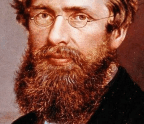“I AM BECOME DEATH, THE DESTROYER OF WORLDS”



In Hiroshima on 6 August 1945 – the day of the Christian Feast of the Transfiguration – a young mother, Futaba Kitayama, looked up to see “an airplane as pretty as a silver treasure flying from east to west in the cloudless pure blue sky”. Someone standing by her remarked: “A parachute is falling.” Then the parachute exploded into “an indescribable light”. The American B-29 bomber Enola Gay had just dropped ‘Little Boy’, a four-tonne bomb which detonated with the power of 15,000 tonnes of TNT. Pilot Paul Tibbets, who had named his plane after his own mother, struggled to hold it steady as the first shock waves hit. Bathed in bright light, he looked back and saw “a giant purple mushroom boiling upward”. Over the intercom he announced to his shaken crew: “Fellows, you have just dropped the first atomic bomb in history.”
The destructive flash that seared Hiroshima into history was the culmination of 50 years of scientific creativity and innovation, and over 50 years of political and military turmoil. Generations of scientists had contributed to that moment. Yet, as they began uncovering the minute building blocks forming the world around them, few could have predicted how their compulsive curiosity would combine with political events to produce a devastating new weapon.
THE DESTRUCTIVE FLASH THAT SEARED HIROSHIMA INTO HISTORY WAS THE CULMINATION OF 50 YEARS OF SCIENTIFIC CREATIVITY AND POLITICAL TURMOIL
The journey began at the end of the 19th century, often called the chemists’ century (as opposed to the 20th, which physicists would dominate). The first step
You’re reading a preview, subscribe to read more.
Start your free 30 days



